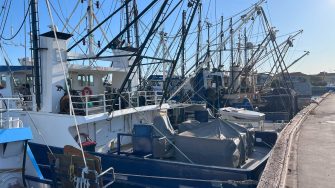Sustainable ocean futures hooked on data
An innovative UNSW Science partnership with fishers crowdsources critical data from under-explored parts of the ocean.
An innovative UNSW Science partnership with fishers crowdsources critical data from under-explored parts of the ocean.

Australia's ocean territory is vast, covering nearly twice the size of its landmass. However, most of our available ocean temperature data comes from surface waters and coastal areas near major cities, leaving significant gaps in our understanding of deeper ocean layers.
Professor Moninya Roughan is an oceanographer based at the UNSW School of Biological, Earth & Environmental Sciences, opens in a new window. She says, “we need more data from the ocean’s depths to understand how it’s changing and what it means for our environment and our fisheries.”
To bridge this gap, Prof. Roughan has co-designed a specialised ocean sensor that can easily attach to fishing gear on commercial vessels. The sensor collects temperature data as the boats fish, turning the vessels into floating research stations.
The Fishing Vessels Ships of Opportunity (FishSOOP), opens in a new window initiative builds on the Moana Project, opens in a new window – a successful program in Aotearoa, New Zealand. Launched between 2017 and 2022, this project responded to commercial fishing losses linked to ocean warming and marine heatwaves.
“We realised we needed reliable data to understand these changes,” Prof. Roughan says.
In collaboration with John Radford from ZebraTech, opens in a new window, they developed a lightweight autonomous sensor with a solar-powered deck unit.
These sensors are deployed on various fishing gear, collecting valuable temperature data from different ocean depths. The data are then relayed via satellite back to researchers through the deck unit.
In just two years, the Moana Project had deployed more than 300 sensors on more than 200 vessels – capturing more than one million temperature measurements each month.



 “By working together, we can enhance our understanding of the oceans and foster sustainable practices that benefit both the environment and local communities.”—Prof. Moninya Roughan
“By working together, we can enhance our understanding of the oceans and foster sustainable practices that benefit both the environment and local communities.”—Prof. Moninya Roughan
Inspired by its New Zealand counterpart, FishSOOP began by deploying sensors on 17 vessels in southeastern Australia in collaboration with Fishwell Consulting, and funded by the Fisheries Research Development Corporation (FRDC), opens in a new window and the Integrated Marine Observing System (IMOS), opens in a new window. The program quickly expanded to nearly 40 vessels.
This collaborative effort involves partnerships with various stakeholders, including state-based fisheries agencies, Tuna Australia, opens in a new window and Indigenous rangers, ensuring that local communities play a vital role in data collection.
“Everyone involved brings unique knowledge and value to the program,” Prof. Roughan says. She says the success of a multi-vocal partnership relies on regular stakeholder engagement, and that includes providing evidence of delivering value.
By sharing data and insights – such as temperature observations – fishers can better understand the conditions that affect their catches and make improvements to sustainable fishing practices, which ultimately promotes a more resilient seafood sector.
“We’re all about fishing smarter, not harder,” Prof. Roughan says.

A 2024 survey found the data from FishSOOP was being used to inform operational decisions about where to fish and which species to target. One tuna skipper used the data to navigate to cooler waters during a marine heatwave.
Another respondent described the data as ‘transformative’. As their target species is transported alive, they found they could match the holding tank temperature to the water temperature at depth – as recorded by the FishSOOP sensor. This reduced the stress suffered by the animals, which enhances the catch.
The success of FishSOOP and similar projects underscores the necessity of international collaboration in ocean research.
Accurate ocean models are crucial for predicting weather patterns, climate change impacts and fishing conditions. But without adequate data from subsurface waters, these models remain incomplete.
Prof. Roughan’s research focuses on understanding the thermocline – the layer of the ocean where temperatures change rapidly.
Recent studies have shown that integrating the temperature data from FishSOOP can significantly enhance ocean models, leading to better predictions for marine environments.
“The challenges we face with sparse ocean data are not unique to Australia,” Prof. Roughan says. “By forming a global community of practice, we can share methodologies and insights, accelerating progress in understanding ocean dynamics.”
The FishSOOP initiative was recognised by the UN Ocean Decade for Sustainable Development, highlighting its commitment to open-access data and predictive modelling.
The team continues to develop and deliver useful reports to fishers, moving towards a predictive approach that anticipates changes – rather than simply reflecting past conditions.
As the initiative expands, it promises to provide invaluable insights not only for Australia but for global ocean health.
